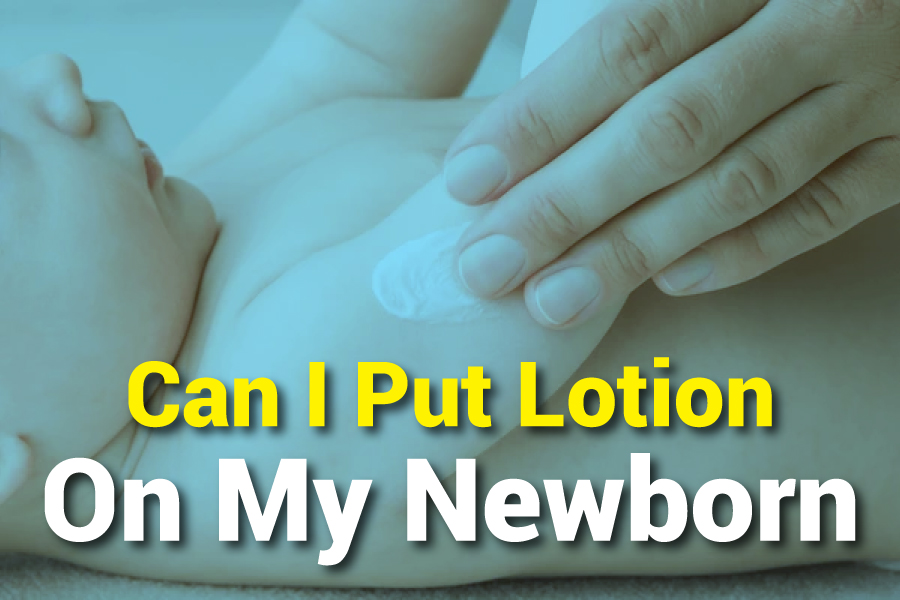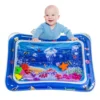Step one is bringing a new baby home; the second is a myriad of questions you have for diapering tender skin. One of the questions that most new parents ask is, “Can I put lotion on my newborn?” Not really, as newborn babies’ skin is susceptible and requires special care. This article will help deal with how and when to use lotions on your newborn and other tips that are in your child’s best interest. Whether you’re worried about dryness, or irritation, or choosing the right products, understanding the nuances of infant skincare is crucial. Let’s explore the best practices to ensure your baby’s skin remains soft, healthy, and well-hydrated without causing any harm or discomfort.
Can I Put Lotion On My Newborn?
Yes, you can put lotion on your newborn, but choose a gentle, baby-specific lotion free of fragrances and harsh chemicals. Apply it sparingly and do a patch test first. Consult your pediatrician if you have concerns or if your baby has sensitive skin. Proper moisturizing can help keep their delicate skin healthy and hydrated.
Understanding Newborn Skin Care
1. Proper Skin Care in Newborns
Newborn skin is much more sensitive than adult skin. It is thin, sensitive, easily dry, and irritated. Hence, it becomes all the more important to establish gentle skin care right from the beginning. While thinking about the application of lotion, products designed for infant skin should be used. These creams are formulated without irritants and respect the natural water balance of the skin. Keeping your baby’s skin well-moisturized will help to prevent conditions such as eczema and cradle cap, very common in babies.
2. How to Choose the Right Lotion
When reaching for a lotion for your newborn baby, try and go for hypoallergenic and fragrance-free products with no added dyes. These lotions are likely to be less irritating to your baby’s skin. Ingredients such as aloe vera, chamomile, and natural oils are good because they provide gentle moisture without blocking the pores. You should also avoid lotions that have alcohol or parabens since these are likely to be too harsh on the tender skin of a newborn baby.
3. How to Safely Apply Lotion
Applying lotion to your newborn requires a gentle touch. First, you will need to do a patch test on a tiny area of the baby’s skin to make sure there are no bad reactions. If the skin remains calm, a full application can be done. Use a small amount and gently massage it into the skin using circular motions —. This includes areas likely to become dry, such as the face, hands, and feet, though avoiding lotion on areas that tend to remain moist, like the diaper area.
4. Common Skin Issues in Newborns
Newborns can have a variety of skin conditions, ranging from baby acne to diaper rash. While such conditions are often harmless and temporary, lubricating the skin can alleviate some of the discomfort. For instance, mild eczema is often controlled by applying a suitable lotion on the baby regularly. However, directly speaking, whenever skin conditions prevail or happen to be severe, it will always be worth communicating with your pediatrician.
5. Consulting Your Pediatrician
Always consult your pediatrician before trying any new skincare product on your newborn. They are able to give individualized advice, which is dependent on the needs and skin type of your baby. This is particularly very important if the baby has noted allergies or skin conditions. Your pediatrician will be in a position to recommend good products and practices that ensure your baby’s skin remains healthy and hydrated.
Key Aspects Of Using Lotion On Newborns
- Safety and Precautions: Safety is therefore paramount when applying lotions to a newborn. Only ever use formulas specifically aimed at infants, and avoid those that contain potential allergens. Doing a patch test before full application can help prevent any allergic reactions or irritation.
- Ingredients to Look For: Look for lotions that contain all-natural soothing ingredients like aloe vera, chamomile, or coconut oil. All of these are generally mild moisturizers and won’t aggravate the skin too much.
- Frequency of Application: Newborn skin does not require moisturizing as often as older children’s. A daily application, especially after bath time, will generally keep your baby’s skin soft and hydrated.
- Areas to Focus On: Apply lotion primarily to dry areas of skin, such as the face, hands, and feet. Avoid putting lotion on areas that tend to stay moist, like in the diaper zone or elbow creases, as this can cause skin irritation in such areas.
- Monitoring for Reactions: After applying a small amount to your baby’s skin, wait several hours and observe your baby’s skin for signs of turning red, swelling, or becoming irritated. If you observe any such bad reactions, discontinue the use and consult your pediatrician.
Other Tips And Recommendations
The bath temperature needs to be lukewarm, and it should involve only gentle fragrance-free soap.
The bath times have to undertake a short duration of 5-10 minutes. If one is using soaps frequently, then the baby will suffer from the dry phase of the skin, which may provoke irritation.
Dry the baby’s skin in a soft towel; pat the skin to dry rather than rub vigorously with the towel. Resorting to cotton-breathable clothing, especially for babies.
Wash new clothes before wearing them to remove the residual chemicals from the shop. Avoid potent detergents that might be harmful to the child.
Keep the nursery at a comfortable temperature. Overheating is not good for the baby.
In dry climates, use a humidifier to keep enough moisture in the air. Protect your baby’s skin from direct sunlight and cold winds.
An Alternate View Of Infant Skin Care
While creams may be effective at keeping a newborn’s skin hydrated, some scientists contend that the less a person does to an infant’s skin, the better. A baby’s natural oils should be enough to keep their skin hydrated. Too many lotions and other products sometimes interfere with these natural processes. It’s suggested that parents just maintain a simple skincare routine by bathing the baby in neat water, rather than using other products where there will be no specific need. This would avoid potential skin problems and allow the baby’s skin to remain as natural as possible, developing its natural barrier function more appropriately. The numerous natural solutions, such as coconut oil or olive oil, could assist in dryness without using harsh commercial lotions at all. These are natural oils that simply absorb and are less irritable.
Ensuring Optimal Skin Health For Your Newborn
1. Hydration
Keeping your newborn well-hydrated will ensure that his skin remains healthy. Breast milk provides hydration from the inside, so breastfed babies in particular need to be hydrated naturally.
2. Gentle Products Use
Gentle, baby-specific products help avoid Irritation. These should be fragrance, and dye-free, and lack harsh chemicals to guarantee the neonate’s safety.
3. Regular Skin Checks
This will help you to check on your baby’s skin regularly and recognize any potential problem quickly. Do watch out for signs of dryness, redness, or possible rash and treat them early enough with appropriate skincare measures.
4. Professional Guidance
Never hesitate to seek professional advice when you get confused about the best way to take good care of your newborn’s skin. Your pediatrician is ever ready to guide you on special attention areas of your baby’s skin.
Conclusion
Attention to the skin condition of a newborn baby is very essential for his or her health and comfort. Products like baby lotions help to keep the skin naturally moist, but you do have to apply the right products in the right manner. Always consult with your pediatrician to get the best care for your sensitive baby. Simple tips will help keep your newborn’s skin soft, healthy, and irritation-free.
Frequently Asked Questions
Can I Use Lotion On My Newborn’s Face?
Yes, but use a mild fragrance-free baby lotion and rub it in well to avoid irritation.
How Often Should I Use Lotion On My Newborn?
Massaging a small amount into their skin once a day, after a bath is a good frequency to keep them well moisturized.
What If My Newborn Develops A Reaction To A Lotion?
Stop using it immediately and call your pediatrician for alternative recommendations.
Are Natural Oils Safe For Newborns?
Yes, coconut oil and olive oil are natural oils that can be gentle and act as a strong substitute for body lotions available in the marketplace.
After How Many Weeks Can I Start Lotion On My Baby?
The lotion can be applied after the first few weeks once your baby’s skin is adjusted to the outside environment.








